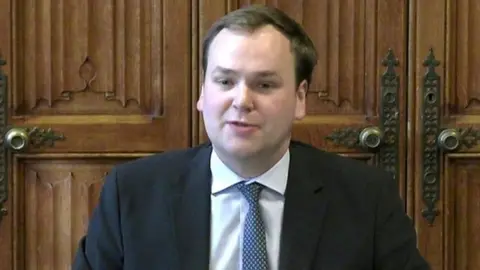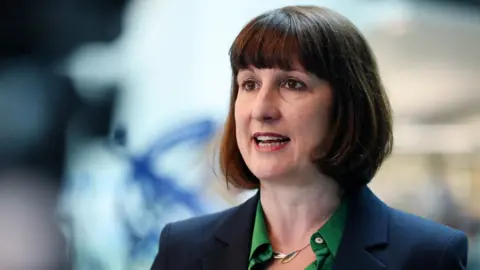William Wragg: Jeremy Hunt praises MP's apology over dating app incident
 BBC
BBCThe chancellor has praised a Tory MP for apologising after he admitted he gave other MPs' personal phone numbers to someone on a dating app.
Jeremy Hunt said William Wragg had been "courageous" in telling the Times he was sorry for the "hurt" he had caused.
Mr Wragg told the newspaper he had been "scared" because the individual had "compromising things on me".
It follows reports at least 12 men in political circles received unsolicited messages, raising security concerns.
The men are reported to include a government minister, advisers and political journalists based at Westminster.
Some had been sent naked images, and two MPs are reported to have responded by sending images of themselves.
Mr Wragg has not been suspended as a Conservative MP and the party's whips office - in charge of party discipline - is not commenting, citing an ongoing police investigation.
However, some MPs have privately expressed surprise that Mr Wragg has not lost the Conservative whip. At least one Tory MP has contacted the whips' office to say he should be suspended from the parliamentary party.
The BBC has attempted to contact Mr Wragg, who is standing down as an MP at the general election, for comment.
'Concern'
A Leicestershire Police spokesperson said the force was "investigating a report of malicious communications" that had been made to them last month.
The Metropolitan Police said it was in contact with Leicestershire Police and Parliament's security team, adding: "We will assess any reports made to us accordingly."
One former MP, who is gay, has told the BBC he was targeted by someone calling themselves "Charlie", who claimed - wrongly - that he had previously worked for Mr Wragg.
"The last part of that message was 'Westminster misses you…' and that was basically something that friends usually do say anyway to make me feel better," he added.
"I was starting to feel bad actually. I was embarrassed thinking I'm speaking to someone who knows who I am and I'm trying desperately not to come across as rude."
The next message said: "I've just become single so I'm hanging out with the Westminster gays."
The former MP explained he was in a relationship, but further flirtatious messages followed. After "Charlie" sent an explicit image, the former MP blocked him.
BBC News has also seen similar messages sent from the same number to a political journalist.
Staffer's story
The BBC has also spoken to a man who works for an MP, who was messaged "out of the blue" last autumn by someone calling themselves "Abi" with a female profile picture.
The staffer said they claimed to know him from work, and mentioned an event he had attended.
But he grew suspicious when he asked who they were, and they replied with information that was "clearly wrong".
He said he ignored them, but they continued to message him. He told the BBC he learned five or six months later that someone else had received messages from a person with the same number and similar picture.
The MP's staff member said he would be "very surprised" if Mr Wragg had his number, and he cannot recall ever having met him.
 EPA-EFE/REX/Shutterstock
EPA-EFE/REX/ShutterstockSpeaking to reporters earlier, Mr Hunt said the reports of unsolicited messages were a "great cause for concern" but Mr Wragg had "given a courageous and fulsome apology".
He added that the reports should be a "lesson" to both MPs and members of the public that they need to be careful about cyber-security.
It is unclear who is behind the unsolicited messages. Some MPs have expressed concerns that a foreign power, such as China and Russia, could be involved.
Commons Speaker Sir Lindsay Hoyle has written to MPs telling them it would be "unwise" to speculate, and promising to keep them "updated on developments".
'Mortified'
Mr Wragg, who is vice chair of the influential 1922 committee of backbench Tory MPs, told the Times said he had sent intimate pictures of himself to a man he met on gay dating app Grindr.
"They had compromising things on me. They wouldn't leave me alone," added the 36-year-old, who has been MP for Hazel Grove in Greater Manchester since 2015.
"They would ask for people. I gave them some numbers, not all of them. I told him to stop. He's manipulated me and now I've hurt other people.
"I got chatting to a guy on an app and we exchanged pictures. We were meant to meet up for drinks, but then didn't. Then he started asking for numbers of people. I was worried because he had stuff on me. He gave me a WhatsApp number, which doesn't work now.
"I've hurt people by being weak. I was scared. I'm mortified. I'm so sorry that my weakness has caused other people hurt."
'Misguided'
Conservative MP Sir Charles Walker said it would be "madness" for Mr Wragg, a friend of his, to quit as an MP.
He told BBC Radio 4's PM programme Mr Wragg had "been subject to a sting operation by a very clever and manipulative operator".
He added: "I think a lot of people may think that what Will did was misguided, and even stupid, but I also believe that there's a lot of compassion out there.
"I'm not excusing what Will has done, but I do think that he is a victim in this along with all the others."
Labour's shadow chancellor Rachel Reeves said the incident was "incredibly concerning," and the police investigation "should be able to take its course".
She declined to offer a view on whether Mr Wragg, who also chairs the Commons constitutional affairs committee, should resign, adding it was a "question for the Conservatives".
Liberal Democrat leader Sir Ed Davey would not be drawn on whether Mr Wragg should be suspended, adding it was a question for the Tories.
He added that he did not believe any of his party's MPs had been involved in the apparent phishing incidents.
A House of Commons spokesperson said it took security "extremely seriously" and provided MPs and staff with "tailored advice" to make them aware of risks online.
"We are encouraging anyone affected who has concerns to contact the Parliamentary Security Department," they added.
